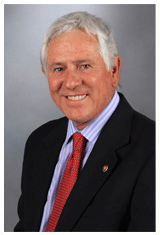JEFFERSON CITY — On May 16 at 6:00 p.m., the Missouri General Assembly concluded the 2014 legislative session. As you may be aware, our legislative session at the state level is shorter than the time our federal Congress spends in session and is filled with citizen legislators who go home to their other jobs the rest of the year. Don’t let the shorter session fool you. We rolled up our sleeves, worked hard, and sometimes had to compromise. This is how government is supposed to work. Without compromising core principles, everyone works together and solves a problem.
One issue that stood out in this regard was the revision of Missouri’s criminal code. For the last eight years, lawmakers have worked to overhaul our criminal code. This has not been done since 1979, so reforming it was long overdue. Senate Bill 491 was the result. The bill updates the penalties for certain crimes, creates new felony and misdemeanor classes, reforms our state’s elderly and vulnerable person abuse laws, and strengthens the laws against those who sexually abuse children. Lawmakers, prosecutors, defense attorneys, and members of the judicial branch all worked together to revise the code to create a strong, modern legal system that upholds our state’s commitment to swift and effective justice. Senate Bill 491 passed with overwhelming bipartisan support and passed early enough in session that it is already law.
The Legislature also approved House Joint Resolution 68, which will let the voters decide if the state should increase the sales tax by three-fourths of a penny to pay for our state’s roads, bridges, and local transportation projects. Missouri has the seventh-largest road system in the country, but it is deteriorating and limiting our economic growth, regional competitiveness, and our citizens’ safety. I am not in favor of raising taxes and have consistently voted to cut taxes, but I do support allowing the people of to Missouri decide if this is how they want to fund roads in our state. This measure received strong bipartisan support in both chambers and will be on the August ballot.
We also passed House Joint Resolution 90, which, if approved by voters at the ballot, would create an early voting period in Missouri. Missouri is one of 15 states that does not currently have early voting. This proposal would encourage voter participation, make it more convenient for hard-working citizens to make it to the polls, and do so in a responsible way. In contrast to other proposals that could cost as much as $10 million, HJR 90 would not cost local government a dollar. If voters approve it, the state would have to appropriate funding for early voting and transfer it to local election authorities. In short, this option provides voters with more time to cast their vote, while protecting the integrity of our elections and preventing runaway costs that local government simply cannot afford. Missourians will have the opportunity to vote on this proposal on the November ballot.
These measures, as well as many others, were some of the priorities your state Legislature worked on this session. For a complete list of bills that were passed this session, you may visit www.senate.mo.gov, go to the “Legislation” tab, and click on the “Truly Agreed” link. Throughout the coming months, I will update you via these Capitol Reports on a variety of topics your General Assembly addressed this year. I hope you will find them helpful and informative.
As always, I welcome your ideas, questions and concerns about Missouri government. You may contact me at the State Capitol as follows: (573) 751-1480, david.sater@senate.mo.gov or by writing to Senator David Sater, Missouri State Capitol, Room 433, Jefferson City, MO 65101. |



